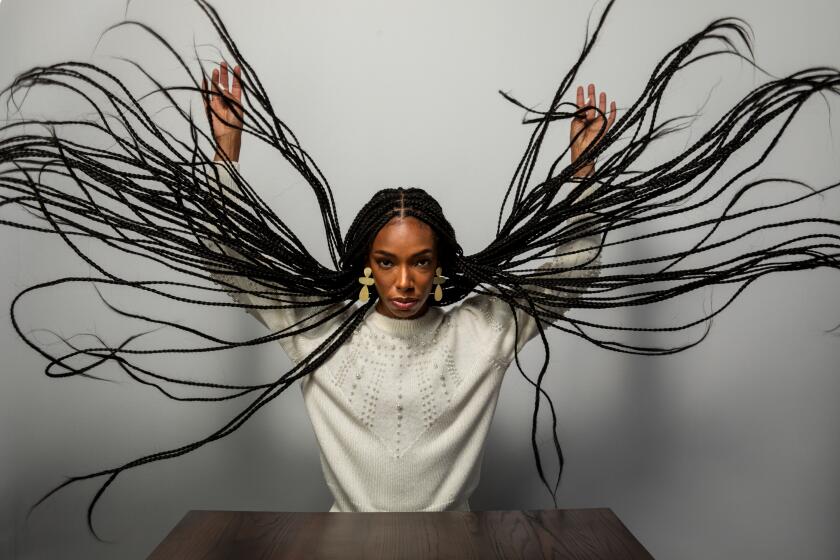Belinda Carlisle and Sundance filmmakers explore Go-Go’s evolution, music and storytelling

Elliot Goldenthal, left, Eugene Ashe, Alison Ellwood and Belinda Carlisle spoke a The Times’ “Music and Storytelling” panel at the Audible Speakeasy at Sundance Film Festival.
- Share via
PARK CITY, Utah — Don’t ask writer-director Eugene Ashe to choose between songwriting and filmmaking. The onetime Sony recording artist’s second feature, “Sylvie’s Love,” stars Nnamdi Asomugha as a jazz musician who falls in love with an aspiring TV producer (Tessa Thompson) in 1950s Harlem — a story that marries Ashe’s two passions. The drama premieres in competition at the Sundance Film Festival on Monday.
“As a songwriter and a screenwriter, the process is very similar — I usually have a beginning, a middle and an end and an idea of something I want to write about,” Ashe said during The Times’ “Music and Storytelling” panel at the Audible Speakeasy on Saturday. “I don’t know which one I like more anymore.”
Scroll through to see Sundance Film Festival moments from the Los Angeles Times Studio presented by Chase Sapphire on Main.
Ashe was joined by Alison Ellwood, director of the Showtime documentary “The Go-Go’s,” which premiered to strong reviews on Friday, and Go-Go’s lead singer Belinda Carlisle, who spoke about the “subterfuge” in the iconic ’80s band’s songs and the “dichotomy” between their melodic pop energy and dark-edged lyrics.
Ellwood’s film puts a strong focus on the band’s pre-fame days in L.A.’s 1970s punk scene. “When you understand that that’s where they came from, you really can hear the punk roots in their pop music,” said the director. “That’s where their musicianship and talent as songwriters developed.”
Directors Ron Howard, Amy Ziering and Heidi Ewing and actresses Sasheer Zamata and Rebecca Hall discussed their Sundance 2020 films at the Audible Speakeasy.
Elliot Goldenthal, the Academy Award–winning composer behind “Frida,” who’s at the fest with Julie Taymor’s Gloria Steinem biopic “The Glorias,” spoke about the film’s nontraditional chronology and how his music “weaves itself through the various nonperiod periods of the movie,” which spans from the 1930s to the present. “Time,” he added, “can be bended.”
Bending back time a little themselves, the panelists cited the artists who moved them most when they were first discovering pop music — for Goldenthal, it was early Louis Armstrong. For Ellwood, “It was probably the Partridge Family,” she confessed with a laugh. Carlisle was 8 or 9, she recalled, when she started singing the 5th Dimension’s “Aquarius” in front of the mirror. Ashe also chose a 1960s phenom: “Without a doubt,” he said, “the Jackson 5.”
More to Read
The biggest entertainment stories
Get our big stories about Hollywood, film, television, music, arts, culture and more right in your inbox as soon as they publish.
You may occasionally receive promotional content from the Los Angeles Times.











